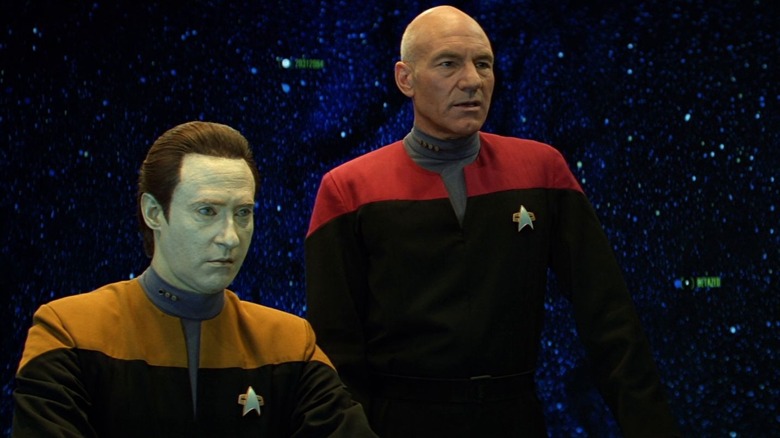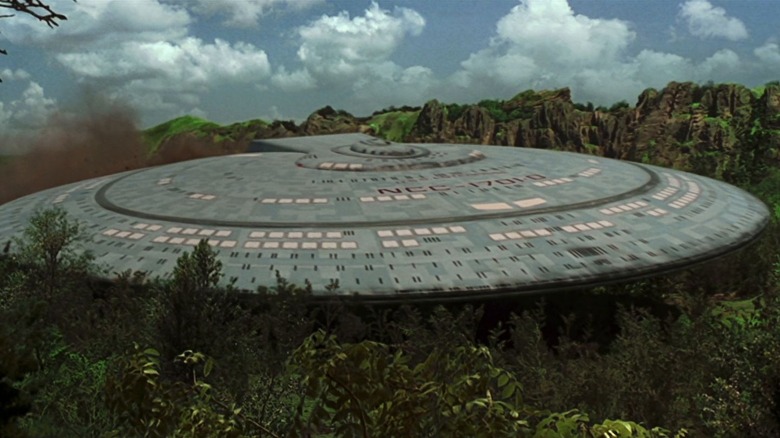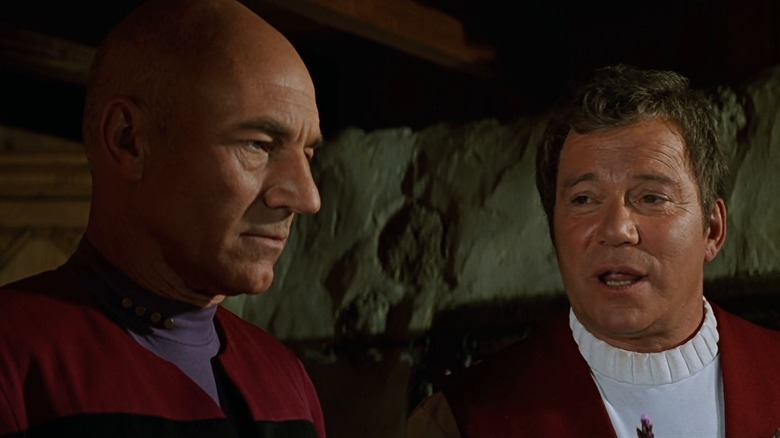Star Trek Generations Came With A Lot Of Franchise Requirements
The busiest time in "Star Trek" history was likely the two-year stretch from 1993 to 1995. In January 1993, "Star Trek: Deep Space Nine" debuted, running alongside the sixth and seventh seasons of the already-popular "Star Trek: The Next Generation." In May 1994, "Next Generation" came to an end with a two-part finale, perhaps one of the best episodes of the series. As soon as that was done, shooting almost immediately began on "Star Trek: Generations," and production was so quick that it hit theaters in November of that same year. And, because resting appears to be anathema, the new series "Star Trek: Voyager" debuted in January 1995.
In two years, the franchise churned out 98 episodes and a feature film.
When making "Generations," however, everyone was in the thick of it. The writers, actors, and all the rest were working overtime to shift from the finale of "NextGen" into a large-scale movie. If that wasn't enough hard work, Paramount — Trek's parent company — rather frustratingly felt the need to get involved. Although a dedicated team of writers and producers had hit their stride on "Next Generation," and made the sci-fi series into something notable and popular, Paramount felt that a movie was a different animal and that it needed to be made in a very particular way. There was some concern that a new "Trek" movie wouldn't be attractive to a mainstream audience and that ticket-buyers would only show up if the cast of the original "Star Trek" was somehow involved.
All of a sudden, ideas were streaming down from the Paramount offices, making production just that much more complicated. "Generations" co-screenwriter Ron D. Moore recalled his time working on "Generations," and some of the studio's notes, in a 2016 retrospective in the Hollywood Reporter.
The difference between 'First Contact' and 'Generations'
Moore was making comments after he had been free from "Generations" for a few years. He was looking back over all four of the "Next Generation"-based feature films, and recalling which ones he liked working on, and which ones he didn't. It seems that "Generations" was already unpleasant, but was even more unpleasant when compared to the 1996 film "Star Trek: First Contact," which gave the filmmakers a lot more breathing room, creatively. "Generations" was a block-and-tackle setup with executive notes. Moore said:
"The big difference between 'First Contact' and 'Generations' was right at the start, there really wasn't a list of things to do. There was no mandate. When we did 'Generations,' there was literally a list of things that the movie had to accomplish. It had to be a transition from one cast to the other. You could only have the original series cast in the first 10 minutes. It had to have the Klingons in it, it had to have a big villain, it had to have time travel in it. It was all this stuff."
Moore also spoke on the DVD commentary track for "Generations," and went into a little more detail. Early in the production of the film, executive producer Rick Berman said that "Generations" had to be a "passing the torch" movie from the original "Star Trek" to the new generation of actors. This was a dumb idea, as "Next Generation" had been very successful on its own for seven years, and already featured multiple cameos from original series actors.
Paramount, meanwhile, wanted to save some money by hiring the original series cast, but only allowing them to appear in the first ten minutes of the movie. No one liked that.
More mandates
The studio said that Admiral Kirk (William Shatner) could re-appear at the end, but not the whole cast. Because their roles were so small, many of the original cast members elected not to participate; only Shatner, Walter Koenig, and James Doohan appeared. Paramount had also come to the conclusion that "Star Trek II: The Wrath of Khan" was the best-liked movie in the franchise, despite the fact that "Star Trek IV: The Voyage Home" made a great deal more money. Paramount decreed that the writers of "Generations" include a Khan-like villain. Their solution was Dr. Soren (Malcolm McDowell), a scientist who was destroying entire star systems just to re-enter a free-flying space phenomenon called The Nexus.
Also, the studio not only wanted Klingons in the film in some capacity but demanded a comedic subplot involving the android Data (Brent Spiner). There was even a mandate — albeit very briefly — wherein the story of "Generations" was to see the Enterprise-D engaged in combat with the Enterprise-A. To contrive such a confrontation, however, the plot of "Generations" would have been way, way too complicated, so the idea was mercifully dropped.
All the above mandates came after Berman held what might be considered a screenwriting competition for "Generations." Onetime NextGen producer Maurice Hurley also turned in a draft for a "Star Trek" movie back in 1993, inventing a mad interdimensional villain that was unwittingly ripping apart the fabric of space-time.
The film audiences ultimately saw wasn't terribly exciting. Audiences seemed to like "Star Trek: First Contact" much more.


